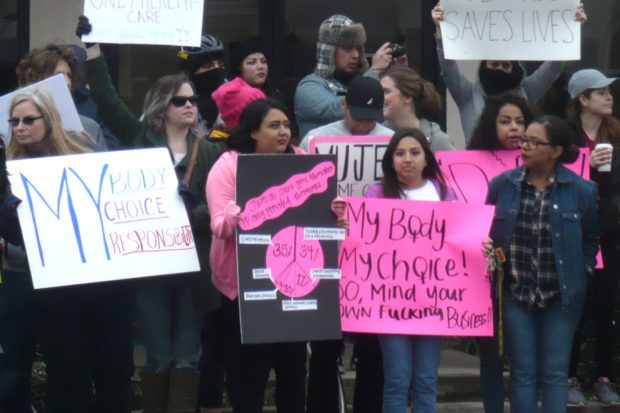
In the United States, attacks on reproductive rights and freedoms and other aspects of healthcare for women are increasing sharply, and the courts, which for a brief period provided some protection for these rights, are showing indications that this protection will cease.
These attacks on the rights of women are accompanied by attacks on the rights of all others who are not White heterosexual men. This coordinated wave of attacks, which includes challenging voting rights and the accurate teaching of history and current events in schools, is particularly focused on that most vulnerable segment of society—transgender youth.
What are some of the other implications of the concept that “‘unenumerated rights’ to privacy or autonomy in general have no constitutional grounding”?
This is the beginning. If the rule of law is going to be that we have only those constitutional rights formulated and specifically enumerated by White men in the late 18th century, then the rights to access contraception and to same-sex marriage will also be lost.
As voting rights continue to be lost through voting restrictions and gerrymandering, policies supported by a powerful minority who are anti-woman, anti-BIPOC (Black, Indigenous and people of color) and bizarrely hostile to homosexual, trans and non-binary people will be enforced.
These policies, including those that force people to remain pregnant and give birth against their will, are cruel and immoral. Their impact will fall disproportionately on poor people and people of color. These same ultra-right-wing forces that oppose reproductive rights also oppose funding for prenatal care or healthcare of any kind, parental leave and childcare.
Anti-abortion policies harm women, children and families of all races and ethnicities, but Black women and children will be most harmed.
Nationwide, Black women are more likely to have high maternal mortality—to die as a result of pregnancy and childbirth—and Black babies are more likely to die before their first birthdays. This is the result of poverty; lack of healthcare, especially inadequate prenatal care; and lack of access to birth control.
Black women are also more likely to need abortions. If there were really a pro-life movement, rather than a movement to control and subjugate women, then their focus would be on better care for women and children, and for people in general.
The states that already have laws in place to deny women autonomy over their own bodies as soon as the Supreme Court permits them to do so are Arkansas, Idaho, Kentucky, Louisiana, Mississippi, Missouri, North Dakota, South Dakota, Tennessee, Utah, Texas, Oklahoma, Wyoming, Alabama, Arizona, Georgia, Michigan, North Carolina, Ohio and South Carolina.
These are states in which the health indicators for all people are worse than the national average, but the disparity is even worse for Black people in these states. It is also worse for Mexican American/Chicana women, who also have less access to healthcare and more need to seek abortion compared to the White population.
What We Want
People in the United States and globally are striving for alternatives to violence, the end of poverty and discrimination, and an emphasis on human development that includes the rights to healthcare, housing, education and reproductive freedoms that provide the material conditions for full social, cultural and political participation for all.
We want not only access to contraception and full reproductive healthcare, including abortion, but also the ability to have children and to parent and care for them in a environment free from violence, including state and police violence, in communities that support healthy families of all kinds.
Contrasts: Cuba and the United States
Abortion. Cuba legalized abortion in 1965. When you read about this, the usual phrasing is that “Cuba was the first country in Latin America and the Caribbean to legalize abortion.” True, but that understates the truth. Cuba legalized abortion eight years before Roe v. Wade in the United States in 1973. It was 23 years before Canada’s equivalent Supreme Court decision.
Cuba was the first country in the western hemisphere to allow women control over their own bodies. It wasn’t even close.
Within the Cuban free universally accessible community-based healthcare system, termination of pregnancy is a medical procedure available to women without restriction.
Birth. Women who choose to have children are supported by this system with excellent prenatal care and community support that have reduced Cuba’s infant mortality rates below those of the United States. The difference is even more marked for Black infants; according to maternal and child health expert Kathryn Hall-Trujillo, Cuba is the best place on the planet for a Black infant to be born.
Parental leave. Parental leave rights are also guaranteed. Cuba meets the UNICEF standards for parental leave, the only country in Latin America to do so. The United States does not meet these standards.
Protection against discrimination. In 1979, the UN General Assembly approved the Convention on the Elimination of All Forms of Discrimination Against Women (CEDAW) and Cuba immediately ratified it. Although President Jimmy Carter signed for the United States in 1980, the United States has never ratified the CEDAW.
Even prior to this, all discrimination against women had been outlawed by the Cuban Constitution. These protections have only been strengthened and increased in subsequent Cuban constitutions, most recently in 2019. The Equal Rights Amendment to the U.S. Constitution has never been adopted, as state-by-state ratification was required with a deadline.
The legal system. Cuba is now creating a revised legal code that includes the protection of the right of all people to form a family without discrimination; updates the legal definition of family institutions with inclusive rather than strictly heteronormative models; establishes the right to a family life free from violence; treats children as the responsibility of their parents rather than as possessions; and centers the values of love, affection, solidarity and responsibility.
In the United States, our rights are under attack by a Supreme Court with a large number of right-wing justices appointed by right-wing presidents who were “elected” by the Electoral College after losing the popular vote.
Neil Gorsuch, Brett Kavanaugh and Amy Coney Barrett are Trump appointees. Samuel Alito and John Roberts were appointed by George W. Bush, also a popular vote loser, who was “appointed” by the Supreme Court, which refused to count the Florida votes.
It has long been evident that the right-wing strategy has nothing to do with democracy or majority rule, as they focus not on winning votes but on disenfranchising those who will vote against them. Their focus has been on power, not democracy, and it has been successful.

